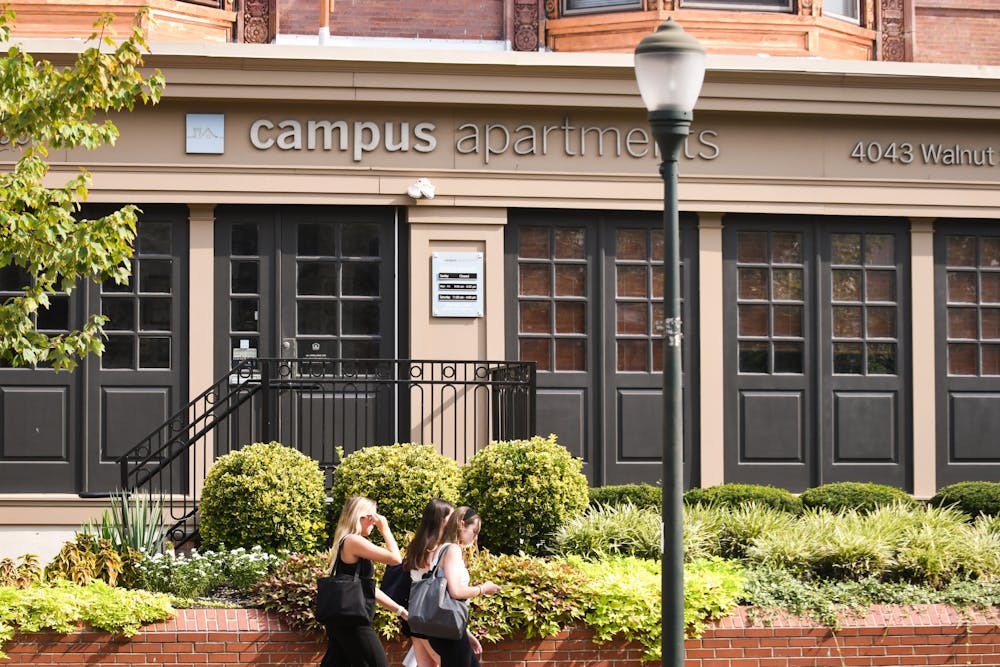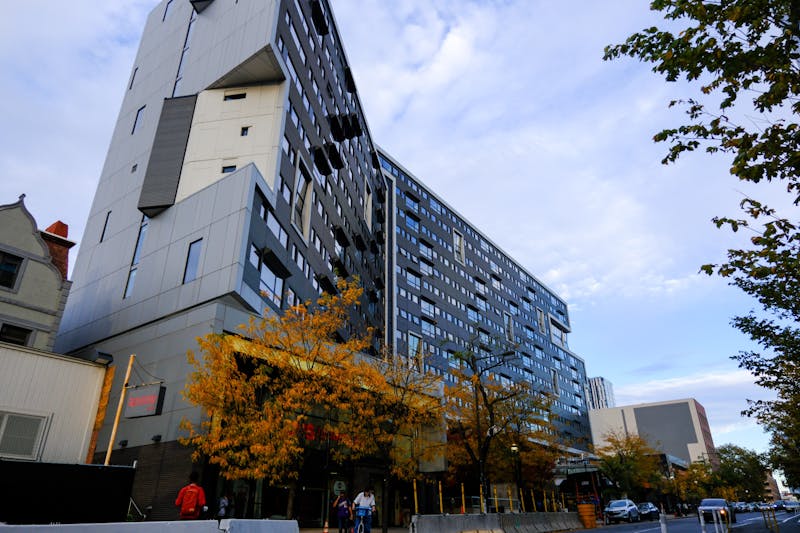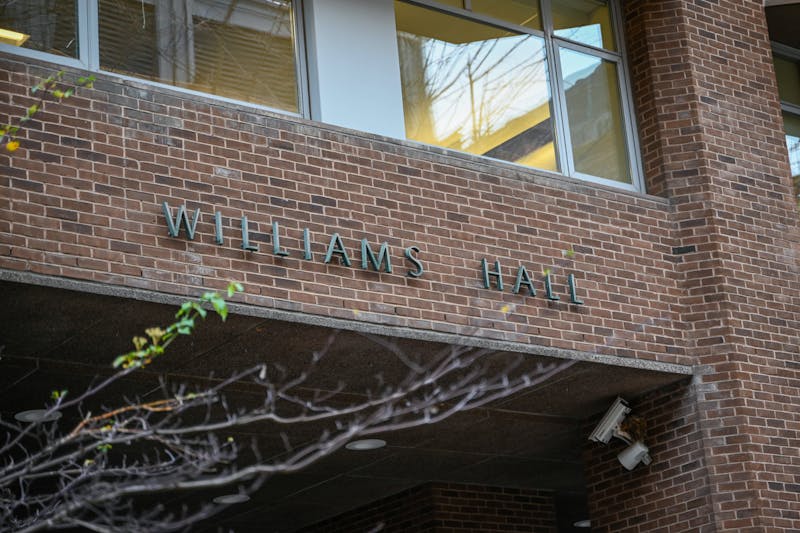
The headquarters of Campus Apartments is located at 4043 Walnut Street.
Credit: Derek WongFrom a lack of pest control to sewage leaks, some Penn students living off campus have reported frustrations with their management.
While students have been required to live on campus for their first two years since 2021, many choose to move off campus once they are upperclassmen. Over 5,700 undergraduates live off campus, Penn Business Services Director of Communications and External Relations Barbara Lea-Kruger told The Daily Pennsylvanian, pointing to data from Penn's Office of Institutional Research & Analysis.
Many of the properties in University City are owned by Campus Apartments, a Philadelphia-based student housing company. David Adelman, a member of the Penn Medicine Board of Trustees, serves as Campus Apartments' chief executive officer.
Campus Apartments formed in 1958 to cater to Penn students and formed an official partnership with the University in 2002. It has expanded into a national company that controls Penn’s Greek housing, several other projects near Penn’s campus, and countless off-campus properties for students.
"To say we hold ourselves to a high standard is an understatement – we are continuously looking for ways to better our communities and our environments for our residents and our employees," a Campus Apartments spokesperson wrote in a statement.
2022 College graduate Dominic Weiss, who lived in a building managed by Campus Apartments, said that he has had issues with pests throughout his time as a tenant.
“I had mice I was seeing the day I moved in,” he said. “Roaches as well — out of the blue, my apartment was just full of them.”
Weiss told the DP that he called his landlord to complain multiple times to no avail, later reporting the issues to the City of Philadelphia’s Department of Licenses and Inspections.
“I did some digging and the apartment that I was in had had a bunch of problems with the city in the past,” Weiss said, noting instances of pest violations and drainage problems. “There were just a bunch of things where I’m like, none of this looks really good.”
Weiss also said that "little things would go wrong the entire time" he lived in his off-campus residence, adding that the apartment was in "really, really bad shape" when he moved in and required a deep clean.
Two violations were reported at Weiss' residence several years before he lived on the property. One, in regards to a sewage issue, was opened on July 29, 2010 and closed on Dec. 22, 2010. The second, in regards to fire certification and a rodent issue, was opened on Jan. 7, 2014 and closed on Feb. 10, 2014.
Weiss also criticized University City Associates, another management company with Penn affiliations. UCA, which has been managed by Campus Apartments since a merger agreement in 2002, owns around 75 off-campus properties.
In a 2023 guest column for the DP, Weiss wrote that, according to city records, a third of the properties listed on UCA’s website have failed city inspection at one time or another. He called on the Department of L&I to “get serious not only about conducting inspections, but also about supporting and reforming its inspectors.”
Weiss said that he found it notable that Penn owns a substantial portion of the properties managed by UCA. Data shared with the DP shows that, of a sample of 68 UCA-managed properties, nearly 45 are owned by the Trustees of the University of Pennsylvania.
Incidents reported on these properties include several “unsafe structure” violations, instances of plumbing and construction work done without permits, and extermination issues — some of which are classified as “hazardous.”
Penn students complaining about their off-campus housing is not a new phenomenon. A 2012 lawsuit filed by students living in a Penn-owned property managed by Campus Apartments alleged “utterly reprehensible conditions,” including “leaks, rodents, mold and the collapse of their third floor bathroom ceiling.” The lawsuit, which revolved around short-term work orders, was settled out of court in early 2013 for approximately six months of rent.
Weiss asserted in his column that none of these experiences should be taken as one-offs.
“Either you're in on-campus housing or you're in off-campus housing, but who owns it at the end of the day? It's Penn a lot of the time,” he wrote. “There's something to be said about the fact that there's such a low standard in both of the options that you know … the way things are, your options are deal with it or leave.”
Weiss added that he would not have signed his lease if he had looked at the property's history beforehand.
The Campus Apartments spokesperson wrote to the DP that their residents are their "top priority," and they "don’t allow issues that impact resident experience to go unresolved."
"Our care for our residents is evident in our increased resident retention rate of 54% (the national average is 40%, according to the National Apartment Association), even as the student housing landscape becomes more competitive," the spokesperson added.
Engineering junior Eugenia Kritsuk — who lives in a house owned by University Enterprises Student Housing —shared similar difficulties with her landlord, though she also acknowledged some more positive experiences.
“It’s been all over the place,” she said. “In terms of maintenance requests, if it’s something small with the garbage disposal, they usually come in and fix that. But on occasion, they'll just complete the maintenance requests, and they'll, like, stop by and look at it and not do stuff.”
Kritsuk shared one experience when her “ceiling from the second floor was kind of caving into the first floor, and you [could] see that there's evident water damage there,” noting that her landlord’s solution did not fix the problem.
“There was a buildup due to the leak, [and] our water bill was like $400 for the month," she said. "We tried to argue with them and be like: 'Hey, it’s because you didn’t fix it the first time.'"
Kritsuk said that, after the initial problem, there was another basement clog that resulted in the basement being flooded with sewage.
“That also happened in another house … there was some buildup which caused sewage to come out of the basement floor bathroom," she added. "So that on top of the $400 water bill was kind of too much for us to handle."
However, Kritsuk said communication with her management company is positive overall.
“Sometimes it takes a little bit of haggling to get the right person on the line, but they definitely do communicate over the phone well, and they do fulfill maintenance requests in a timely manner,” she said. “They do the bare minimum.”
University Enterprises owner Stephen Herman wrote in a statement to the DP that the company’s buildings are its priority, highlighting same-day turnaround times on work orders and an after-hours emergency line.
“Our rapport with our tenants is everything,” Herman wrote, also noting that University Enterprises has “had a very good working relationship with Penn” over the years and has worked with the University on various safety and beautification projects.
“We pride ourselves on our maintenance response,” he wrote in the statement.
College junior Valeria Bonomie Piñerua criticized Penn's role in managing off-campus housing, citing various companies' connections to the University.
“It’s definitely hard being a student and renting,” Bonomie Piñerua said. “Penn obviously owns a lot of property in West Philadelphia and is continuing to buy more … it’s those properties [that] are already belonging to Penn and their unwillingness to return them to the community.”
Weiss echoed these sentiments, noting that the consistent renovation of dorms on Penn’s campus — which has led to the University leasing out The Radian and The Axis to serve as College Houses for the next few years — has led to “ridiculously high” occupancy on the housing waitlist.
“With Penn, this is obviously a conscious decision they’re making,” he told the DP. “They know about the shortage of housing … they knew they had this need and it feels pretty conscious to me that they elected not to meet it.”
Editor's note: This article has been updated to add additional comment from Campus Apartments.
The Daily Pennsylvanian is an independent, student-run newspaper. Please consider making a donation to support the coverage that shapes the University. Your generosity ensures a future of strong journalism at Penn.
Donate







